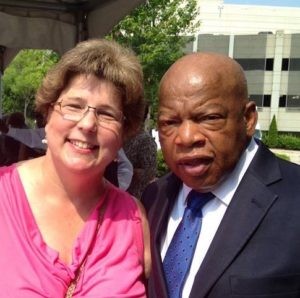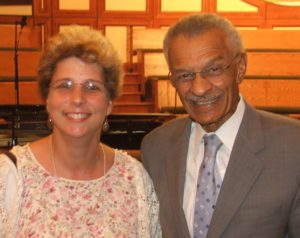I was born in Selma, Ala., in November 1962. I lived in a little ranch house on Dixie Drive, three miles from the Pettus Bridge.
The only memories I have of Selma were the stories told by my parents, who shared a different narrative than the ones I learned from my history books. I remember Daddy telling me about the washing machine he bought from his distant cousin and fellow railroad workmate, Joseph Smitherman, the mayor of Selma in 1965. My parents were baptized there in the little Baptist church, the first community of faith they knew thanks to the preacher who lived down the street. For many of my kin, coming to Selma was a nice Saturday drive from their rural Alabama homes for weekend shopping and babies to be born in the hospital for the first time.
The picture was painted with a simple brush reminiscent of small, rural Alabama where everybody was related in some way or another.

JoEllen Duke Holmes with Rep. John Lewis.
When I tell people I was born in Selma, I usually receive a look of amazement, like a person born with celebrity status. After all, to most Americans, Selma is connected to the images of Bloody Sunday, the Voting Rights Act, John Lewis, the National Guard and George Wallace. Selma became a famous town not by the will of its own.
Momma and Daddy didn’t talk much about what happened in Selma, except when the news reported something about Dr. King. Their words were never positive. They certainly did not welcome the world to their sleepy town. For them, everything just seemed fine the way it was. Momma would say, “Don’t get me wrong, I believed in equal rights, but I just didn’t like what was going on.” My parents wanted the turbulence to go away. They chose to go inside their house and batten down the hatches.
On one visit home from seminary, I was reading Why We Can’t Wait, a required reading in my church history class. There was a fiery conversation at the dinner table that night. I argued and cried in defense of my education and my new African American friends. Momma and Daddy vehemently cried their tears of fear. They described their coworkers, mean people who were members of the Klan, the mayor who they trusted, and the good people of Selma. I scoffed back with my own anger, left the table and never mentioned it again.
“Fear stopped my parents in their tracks and caused them to go indoors.”
In 1989, I had an epiphany. My father had died from a heart attack. My mother was dying with cancer. So, I decided to record her story. With my old cassette recorder in hand, I asked her to share her experience of Selma. Her words were tender when she spoke about her neighbors and friends at church. But her voice quivered when she talked about the crowds around Brown Chapel (only a few blocks from our home), the National Guard with their dogs and sticks, and the news cameras. At age 27, my light bulb turned on. For the first time, I heard her fear and anguish about this changing time.
The truth was that without Selma, the world would not have awakened to the horror of segregation and lack of equal rights for all people. That sleepy little town became the center of all that was true all over the world. Sleepy places needed awakening, painful as it was.
Fear stopped my parents in their tracks and caused them to go indoors. But fear was the energy that fueled the courage of people like John Lewis and C.T. Vivian. Fear can paralyze us or act as a messenger.

JoEllen Duke Holmes with C.T. Vivian.
As an adult, I had the honor of meeting both C.T. Vivian and John Lewis. I met Rev. Vivian while visiting Ebenezer Baptist Church. And at the opening of the Human Rights Museum, I scrambled through a crowd to introduce myself to John Lewis. On both of those occasions, I shared with them about my birthplace, who I was related to and the different narratives I heard as a child. I told both of them it was an honor that I was standing there with them in that moment.
Both had similar responses. They hugged me and reminded me that we are all a part of the Beloved Community, and they offered thanksgiving that we were together in this place. I sobbed with gratitude. It was if these men offered their own gift of grace to me and my late parents.
I will remain grateful for how these men touched my life and changed the world around them. I am grateful that my story began in Selma and that I will forever be connected to that time and place in history.
JoEllen Duke Holmes is a clinical social worker in the Atlanta area and is a member of Oakhurst Baptist Church.
